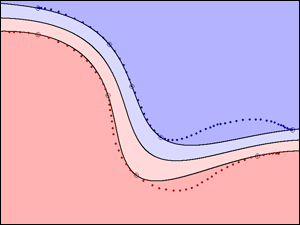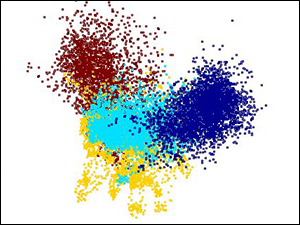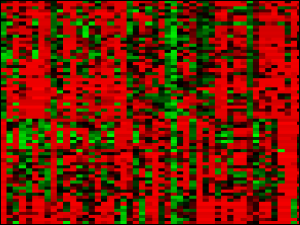Course Description
Machine learning algorithms are data analysis methods which search data sets for patterns and characteristic structures. Typical tasks are the classification of data, automatic regression and unsupervised model fitting. Machine learning has emerged mainly from computer science and artificial intelligence, and draws on methods from a variety of related subjects including statistics, applied mathematics and more specialized fields, such as pattern recognition and neural computation. Applications are, for example, image and speech analysis, medical imaging, bioinformatics and exploratory data analysis in natural science and engineering:
 |
 |
 |
| Non-linear decision boundary of a trained support vector machine (SVM) using a radial-basis function kernel. | Fisher's linear discriminant analysis (LDA) of four different auditory scenes: speech, speech in noise, noise and music. | Gene expression levels obtained from a micro-array experiment, used in gene function prediction. |
Other related courses offered at the D-INFK include: Computational Intelligence Lab, Probabilistic Artificial Intelligence, Advanced Topics in Machine Learning, Information Retrieval, Data Mining.
News
| Date | What? |
|---|---|
| 13.01 |
|
| 10.01 |
|
| 04.01 |
|
| 23.12 |
|
| 20.12 |
|
| 19.12 |
|
| 16.12 |
|
| 12.12 |
|
| 05.12 |
|
| 02.12 |
|
| 30.11 |
|
| 28.11 |
|
| 27.11 |
|
| 20.11 |
|
| 18.11 |
|
| 13.11 |
|
| 08.11 |
|
| 07.10 |
|
| 06.11 |
|
| 05.10 |
|
| 01.11 |
|
| 31.10 |
|
| 28.10 |
|
| 27.10 |
|
| 26.10 |
|
| 25.10 |
|
| 24.10 |
|
| 24.10 |
|
| 23.10 |
|
| 23.10 |
|
| 17.10 |
|
| 17.10 |
|
| 14.10 |
|
| 13.10 |
|
| 10.10 |
|
| 10.10 |
|
| 30.09 |
|
| 27.09 |
|
| 27.09 |
|
| 26.09 |
|
| 26.09 |
|
| 20.09 |
|
| 19.09 |
|
Syllabus
Some of the material can only be accessed with a valid nethz account.
General Information
VVZ Information: See here.Time and Place
Lectures| Mon 14-15 | ETF C 1 |
| Tue 08-10 | (NEW) HG E 7 (lecture) (NEW) HG E 3 (live streaming) |
| Time | Room | Remarks | Wed 13-15 | CAB G 11 | Surnames A-F |
|---|---|---|
| Wed 15-17 | CAB G 61 | Surnames G-K | Fri 08-10 | (NEW) ML E 12 | Surnames L-R |
| Fri 13-15 | CAB G 61 | Surnames S-Z |
* All tutorial sessions are identical, please attend the session assigned to you based on the first letter of your last name
Exercises
The exercise problems will contain theoretical Pen&Paper assignments. Please note that it is not mandatory to submit solutions, a Testat is not required in order to participate in the exam. We will publish exercise solutions after one week.
If you choose to submit:- Send a soft copy of the exercise to the respective teaching assistant for that exercise (specified on top of the exercise sheet). This can be latex, but also a simple scan or even a picture of a hand-written solution.
- Please do not submit hard copies of your solutions.
Project
Part of the coursework will be a project, carried out in groups of 3 students. The goal of this project is to get hands-on experience in machine learning tasks. The project grade will constitute 30% of the total grade. More details on the project will be given in the tutorials.
Exam
The mode of examination is written, 180 minutes length. The language of examination is English. As written aids, you can bring two A4 pages (i.e. one A4 sheet of paper), either handwritten or 11 point minimum font size. The written exam will constitute at 70% of the total grade.
Questions and Discussion Forum
To account for the scale of this course, we will answer questions regarding
lectures exercises and projects on Piazza. To allow for optimal information
flow, please ask your content-related questions on this platform (rather than
via direct emails) and label them accordingly (e.g., by indicating which lecture
/ project your question refers to). In this manner, your question and our answer
are visible to everyone. Consequently, please read existing question-answer
pairs before asking new questions.
You can enroll to our Piazza course page via the Piazza link
Text Books
C. Bishop. Pattern Recognition and Machine Learning. Springer 2007.
This is an excellent introduction to machine learning that covers most
topics which will be treated in the lecture. Contains lots of
exercises, some with exemplary solutions. Available from ETH-HDB and
ETH-INFK libraries.
R. Duda, P. Hart, and D. Stork. Pattern Classification. John Wiley & Sons, second edition, 2001.
The classic introduction to the field. An early edition is available online for students attending this class, the second edition is available from ETH-BIB and ETH-INFK libraries.
T. Hastie, R. Tibshirani, and J. Friedman. The Elements of Statistical Learning: Data Mining, Inference and Prediction. Springer, 2001.
Another comprehensive text, written by three Stanford statisticians. Covers
additive models and boosting in great detail. Available from ETH-BIB
and ETH-INFK libraries.
A free PDF version (second edition) is available
online
L. Wasserman. All of Statistics: A Concise Course in Statistical Inference. Springer, 2004.
This book is a compact treatment of statistics that facilitates a deeper
understanding of machine learning methods. Available from ETH-BIB and
ETH-INFK libraries.
D. Barber. Bayesian Reasoning and Machine Learning. Cambridge University Press, 2012.
This book is a compact and extensive treatment of most topics. Available for personal use online: Link.
K. Murphy. Machine Learning: A Probabilistic Perspective. MIT, 2012.
Unified probabilistic introduction to machine learning. Available from ETH-BIB and ETH-INFK libraries.
S. Shalev-Shwartz, and S. Ben-David. Understanding Machine Learning: From Theory to Algorithms. Cambridge University Press, 2014.
This recent book covers the mathematical foundations of machine learning. Available for personal use online: Link.
Matlab
The official Matlab documentation is available online at the Mathworks website (also in printable form). If you have trouble accessing Matlab's built-in help function, you can use the online function reference on that page or use the command-line version (type help <function> at the prompt). There are several primers and tutorials on the web, a later edition of this one became the book Matlab Primer by T. Davis and K. Sigmon, CRC Press, 2005.
Previous Exam
Contact
(For questions regarding the course, please use the Piazza system, not the e-mails: Questions)
Instructor: Prof. Joachim M. Buhmann
Head Assistant: Carsten Eickhoff
Assistants:
To be populated